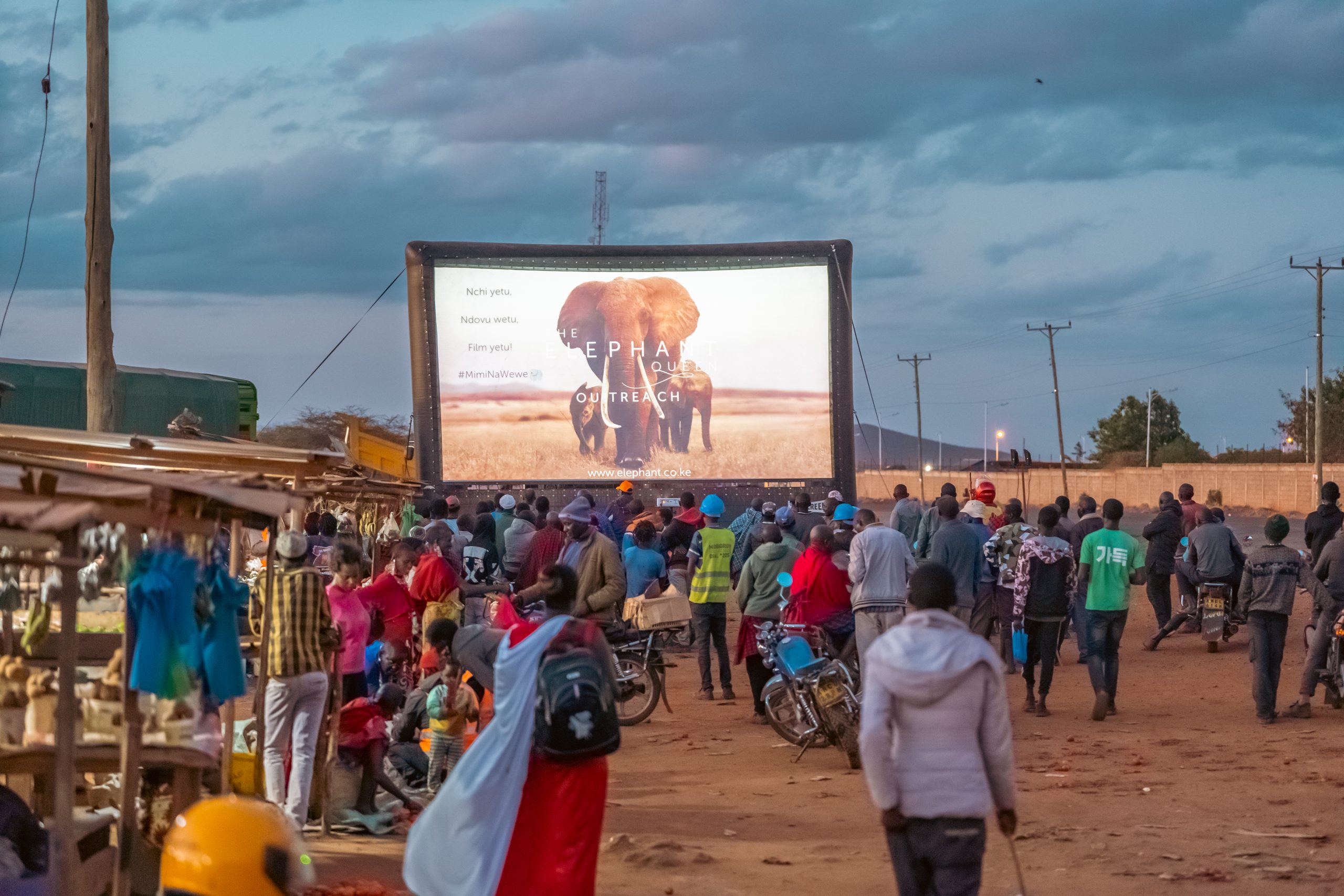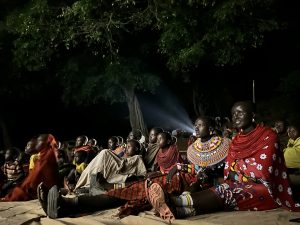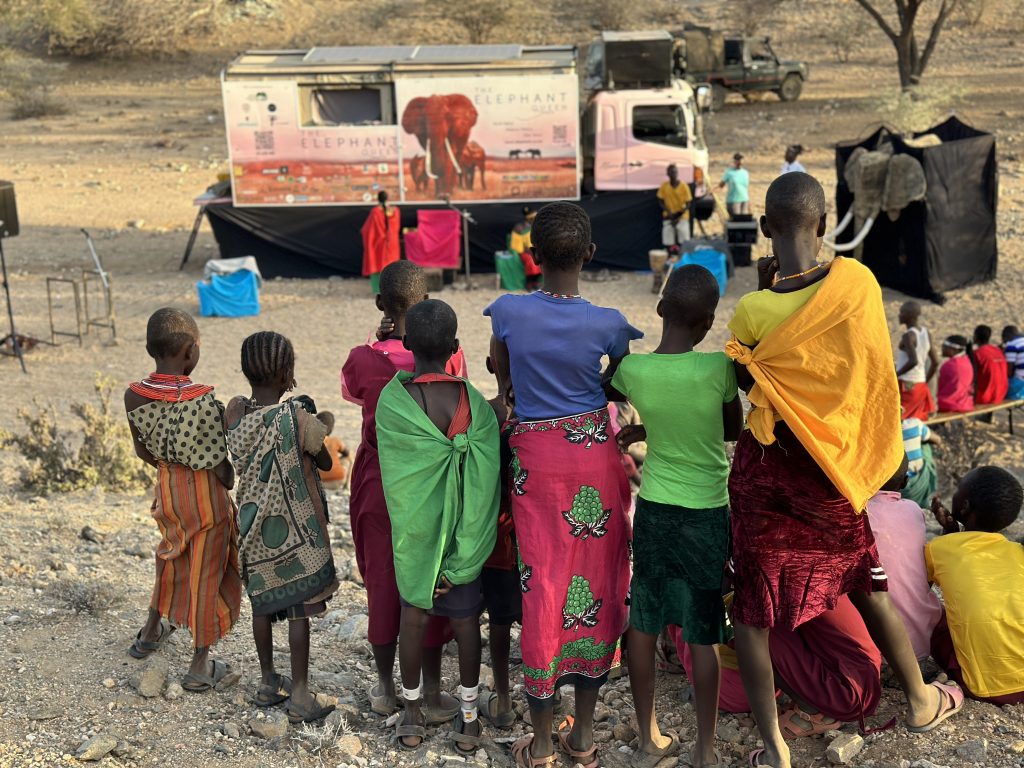The Elephant Queen: How a wildlife documentary inspired rural Kenya
Powerful, award-winning nature films like ‘The Elephant Queen’ have the potential to reshape attitudes and garner support for elephants in rural communities, according to a new study.
New study shows film can transform attitudes towards elephants
March 5 2024, Nairobi. Powerful, award-winning nature films like ‘The Elephant Queen’, made by filmmakers Mark Deeble, Victoria Stone and Etienne Oliff, have the potential to reshape attitudes and garner support for elephants in rural communities, according to a new study. The findings are crucial at a time when Kenya and other parts of Africa are grappling with escalating human-elephant conflict (HEC).
Results from the study by Save the Elephants – one of the sponsors of ‘The Elephant Queen Outreach Programme’s ground-breaking mobile cinema which was created by the filmmakers and traveled the length and breadth of Kenya for two years – suggests that nature films could have a positive influence on conservation efforts in marginalized rural communities grappling with HEC.
The study, published in the journal of People and Nature, shows that 86.7% of community viewers (aged 16-85) who saw ‘The Elephant Queen’ felt the film changed their attitudes towards elephants. On average 79% of viewers believed the film would change their interactions with elephants in the future. 88.4% of viewers felt the film could change their whole community’s relationship with elephants.
The film also appears to have had a positive influence on younger generations, particularly among Kenyan students. Students aged between 16-18 surveyed said they gained knowledge and affection towards elephants and felt the benefits of elephants more keenly after viewing ‘The Elephant Queen’. This suggests that continued exposure to educational content like ‘The Elephant Queen’ could foster a more positive outlook on elephants among Kenyan youth.
Human-Elephant Conflict (HEC) is an increasing problem in rural Africa as elephants and humans compete for resources, resulting in crop damage and loss of life. As a result, local communities often encounter elephants through intense or violent interactions, lacking awareness of the positive contributions these animals offer and rarely witnessing their natural behavior in the wild. Films like ‘The Elephant Queen’ have the potential to alter this narrative.
‘The Elephant Queen’ follows the lives of a Tsavo elephant herd – led by the matriarch Athena – their quest for water, and the extensive journeys they undertake for survival during droughts, emphasizing their role as environmental architects crucial to numerous other species.

Athena and her herd projected on a large inflatable screen shortly before a community screen of The Elephant Queen © Outreach & Education / The Elephant Queen
Following global screenings and multiple international awards, the filmmakers had the script translated into Kiswahili and Maa (the language of the Maasai and Samburu tribes), and began touring Kenya as a mobile cinema to provide rural communities with insights into the true nature of elephants. The film was shown on large inflatable screens erected in local communities – at schools, in marketplaces and other public areas. Within two years, the Elephant Queen Outreach programme visited nearly 300 schools, over 200 villages, and engaged with more than 135,000 people.
As part of ‘The Elephant Queen’ Outreach Programme (Exec dir. Victoria Stone and Directors, Etienne Oliff and Mark Deeble), surveys were conducted before and after the screenings, coupled with interviews from key community figures. The surveys took place between November 2021 and June 2022 and targeted communities surrounding national parks and known to suffer from high levels of human-elephant conflict. A total of 1187 men and women from Tsavo, Arubuko and Amboseli were surveyed including 545 adults and 642 students. Their ages ranged from 16-28 years, 29-41 years, 42-54 years and 55 and above.
Results from Save the Elephants’ study show that while adults gained knowledge and recognized the benefits of elephants, they also felt the challenges of living with elephants more profoundly after viewing ‘The Elephant Queen’. Of the 36.2% of community viewers and 47.6% of school viewers who became concerned about losing elephants after watching ‘The Elephant Queen’. Drought was mostly to blame for this concern (85.9%), followed by poaching (7.8%) and ‘not being cared for’ (6.3%).
A follow-up survey three months later revealed that although the initial impact on adults had subsided, there was a delayed increase in their affection for elephants. This shift in attitude could be attributed to ongoing discussions among both young and old community members, following their exposure to ‘The Elephant Queen.’

Community members watch the live screening of The Elephant Queen © Outreach & Education / The Elephant Queen
Lead author, Dr Harry Fonseca Williams says, “There are few things more epic than watching communities who have never been to the cinema watch a 10 meter inflatable cinema expand before their eyes. The fact that such activities also have a role in inspiring the youth and educating adults is even more exciting. While films alone obviously can’t resolve such a complex form of conflict, they can certainly begin to open hearts to nature and provide awareness of the ecological benefits elephants provide. Beyond entertainment, films act as vehicles for storytelling and facilitate dialogue, allowing for community voices to resonate in the larger conversation about conservation.”
Senior author, Dr Diogo Verrisimo says, “It is key to understand how media shapes our attitudes to the natural world if we are to use it to boost conservation efforts. Documentaries and more broadly video content reach billions of people daily with the rise of streaming platforms but we have a poor understanding of which content has a positive societal impact. Work such as this research by Save the Elephants can be crucial to determine what works, where and for whom.”
Frank Pope, CEO of Save the Elephants, says, “Elephants need the respect of the people that they live beside if they are to thrive in a modern Africa. Films have opened the hearts & minds of people around the world to the importance of nature, but have missed their most important audience. Africans living in rural areas often lack electricity, let alone televisions. ‘The Elephant Queen’ mobile cinema shows how powerful it can be to bring these stories home.”
Key results of the study:
- Films like ‘The Elephant Queen’ can positively influence conservation efforts in marginalized rural communities grappling with conflict
- 86.7% of community viewers felt the film changed their attitudes towards elephants.
- On average 79% of viewers believed the film would change their interactions with elephants in the future
- 88.4% of viewers felt the film could change their whole community’s relationship with elephants.
- Students knowledge of and affection towards elephants increased from watching the film alongside their understanding of the benefits reaped from elephants
- Adults also gained knowledge and an appreciation of the benefits from elephants, however this was a trade off, with viewers also feeling more keenly, the costs of living with elephants.
To read the full study in People and Nature, click here: https://besjournals.onlinelibrary.wiley.com/doi/10.1002/pan3.10599
ENDS
For more details about:
- The study contact: [email protected]
- The Elephant Queen Outreach programme contact: [email protected]
- Save the Elephants, contact [email protected]
About Save the Elephants
Save the Elephants works to secure a future for elephants. Specialising in elephant research, they provide scientific insights into elephant behaviour, intelligence, and long-distance movements and apply them to the challenges of elephant survival and harmonious coexistence with humanity. High-tech tracking helps plan landscapes while low-tech beehive fences, among other tools, provide people /communities living with elephants with protection as well as income. Education and outreach programmes share these insights with local communities as the true custodians of this rich heritage. Save the Elephants runs the Elephant Crisis Fund in partnership with the Wildlife Conservation Network, providing flexible and responsive support to NGOs combatting the ivory trade, promoting human-elephant coexistence, and protecting elephant landscapes. www.savetheelephants.org
About TEQ Outreach
The Elephant Queen Outreach program is a benchmark conservation education program using the award-winning wildlife film, The Elephant Queen and specially written play, The Trial of Athena plus childrens’ reading books to catalyse conversations around human wildlife coexistence and to inspire an appreciation of wildlife and wild spaces. Focusing primarily on remote schools and communities in areas of high human wildlife conflict, the program collaborates with over 50 conservation organisations across Kenya.

Children watch ‘The Trial of Athena’ – a specially written play based on ‘The Elephant Queen’ © Outreach & Education / The Elephant Queen

